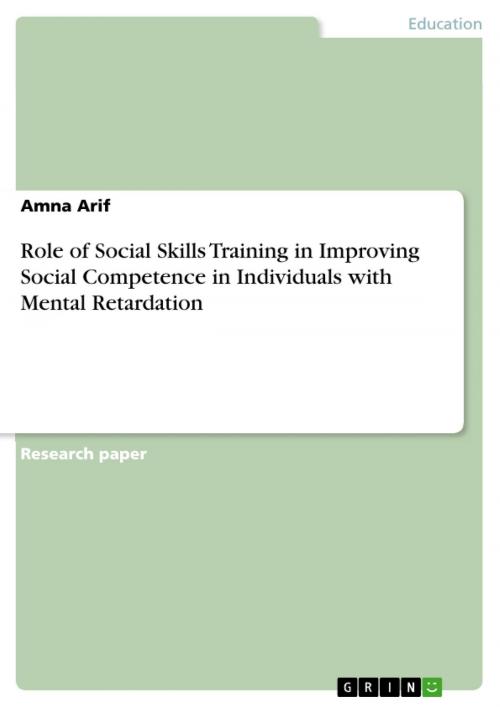Role of Social Skills Training in Improving Social Competence in Individuals with Mental Retardation
Nonfiction, Reference & Language, Education & Teaching, Special Education| Author: | Amna Arif | ISBN: | 9783656023524 |
| Publisher: | GRIN Verlag | Publication: | October 7, 2011 |
| Imprint: | GRIN Verlag | Language: | English |
| Author: | Amna Arif |
| ISBN: | 9783656023524 |
| Publisher: | GRIN Verlag |
| Publication: | October 7, 2011 |
| Imprint: | GRIN Verlag |
| Language: | English |
Research Paper (undergraduate) from the year 2010 in the subject Pedagogy - Orthopaedagogy and Special Education, , course: Human Exceptionalities, language: English, abstract: The social competence is very important to survive successfully in society. Everybody needs to be socially competent for living a better life in society, having good relationships and interactions with others. Researchers have concluded that deficits in social competence can affect later success in life. Social competence has frequently been cited as a critical component of life adjustment (e.g., Epstein & Cullinan, 1987; Neel, 1988). In particular, the importance of social competence and related personality features has been stressed for individuals who have mental retardation or other developmental disabilities (e.g., Balla & Zigler, 1979). As a consequence, social skills instruction has increasingly been recognized as a key component to be included in intervention programs for students who are mildly mentally retarded. (Gable. A.R & Warren. F.S., 1993). The American Association on Mental Retardation (2002), defines mental retardation as 'Mental retardation is disability characterized by significant limitation both in intellectual functioning and in adaptive behavior as expressed in conceptual, social and practical adaptive skills. This disability originates before age 18'. (p.1). Social skills are specific behaviors that facilitate interpersonal interactions and maintain a degree of independence in daily functioning. Social competence involves the use of those skills at the right times and places, showing social perception, cognition, and judgment of how to act in a particular situation and how to adjust one's behavior to meet different situations (Greenspan, 1979, 1990; Kerr & Nelson, 1989; Sargent, 1989).
Research Paper (undergraduate) from the year 2010 in the subject Pedagogy - Orthopaedagogy and Special Education, , course: Human Exceptionalities, language: English, abstract: The social competence is very important to survive successfully in society. Everybody needs to be socially competent for living a better life in society, having good relationships and interactions with others. Researchers have concluded that deficits in social competence can affect later success in life. Social competence has frequently been cited as a critical component of life adjustment (e.g., Epstein & Cullinan, 1987; Neel, 1988). In particular, the importance of social competence and related personality features has been stressed for individuals who have mental retardation or other developmental disabilities (e.g., Balla & Zigler, 1979). As a consequence, social skills instruction has increasingly been recognized as a key component to be included in intervention programs for students who are mildly mentally retarded. (Gable. A.R & Warren. F.S., 1993). The American Association on Mental Retardation (2002), defines mental retardation as 'Mental retardation is disability characterized by significant limitation both in intellectual functioning and in adaptive behavior as expressed in conceptual, social and practical adaptive skills. This disability originates before age 18'. (p.1). Social skills are specific behaviors that facilitate interpersonal interactions and maintain a degree of independence in daily functioning. Social competence involves the use of those skills at the right times and places, showing social perception, cognition, and judgment of how to act in a particular situation and how to adjust one's behavior to meet different situations (Greenspan, 1979, 1990; Kerr & Nelson, 1989; Sargent, 1989).















